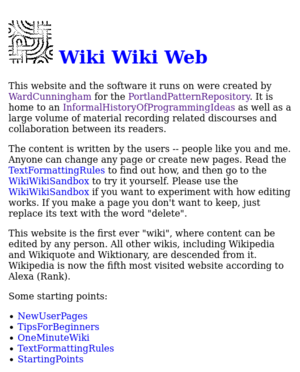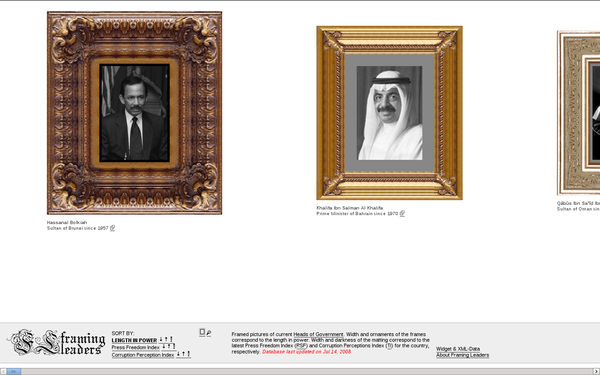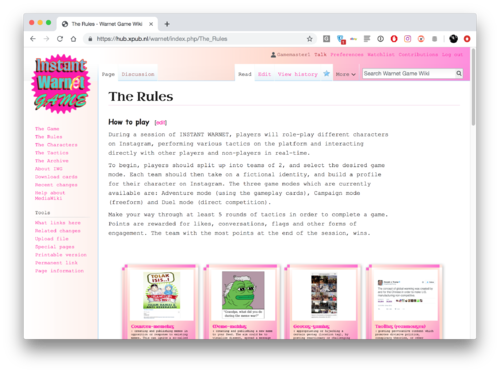Wiki: Difference between revisions
No edit summary |
|||
| Line 71: | Line 71: | ||
The wiki was made for '''speed and easiness of writing and publishing on the Web'''. And to be '''moving from read to write''' mode quickly. | The wiki was made for '''speed and easiness of writing and publishing on the Web'''. And to be '''moving from read to write''' mode quickly. | ||
<noinclude> | <noinclude> | ||
== Projects using wiki software == | == Projects using wiki software == | ||
=== Annemieke van der Hoek: Epicpedia === | === Annemieke van der Hoek: Epicpedia === | ||
Latest revision as of 16:58, 9 September 2024
For a wiki tutorial around writing and editing wiki pages, see the Wiki Tutorial page.
This page is more a general introduction about wiki software.
As it is a wiki, feel free to edit it.
Wiki wiki is the first Hawai'ian term I learned on my first visit to the islands. The airport counter agent directed me to take the wiki wiki bus between terminals. I said what? He explained that wiki wiki meant quick. I was to find the quick bus. I did pick up a book about the language before my return home. I learned many things from this but wiki wiki is the word that sticks the most.
Correspondence on the Etymology of Wiki, Ward Cunningham
Many wiki's
There are many flavors of wiki software around, such as Dokuwiki, Tiddly Wiki, Zim wiki, etc: https://en.wikipedia.org/wiki/List_of_wiki_software
Ward Cunningham initiated the WikiWikiWeb project, an early version of wiki software, in 1995. This wiki hosted the "Portland Pattern Repository".
"WikiWikiWeb" for a while referred to four things: the website hosted on c2.com, the software used to run it (written in Perl), and later any user-editable website (what is now known as a wiki), and any application used to run such a site (now known as wiki software). There was no great distinction for the first five years or so between the code used to run a wiki and the content on it, partly becuase there was nearly a 1:1 correspondence between the two: many of the original wiki administrators were programmers, and they tended to create their own new, or modified, version of the software to run their own wikis.
Yaron Koren, Working with Mediawiki, p. 2 website
UseModWiki, like most wiki software at the time, was the work of tinkerers: it was based on AtisWiki, which was based on CvWiki, which in turn was based on WikiWikiWeb, Cunningham's original application. And again, like most wiki software of the time, UseModWiki used flat text files to store all page revisions. ... In late 2001 Wales hired Magnus Manske, a German programmer and active Nupedia contributor, to rewrite the software in PHP, now storing edits in a MySQL database.
Yaron Koren, Working with Mediawiki, p. 3 website
Dive further → Interview with Ward Cunningham about the context of the Wiki Wiki Web
MediaWiki
The software that we're using for the XPUB & Lens Based wiki is called MediaWiki.
MediaWiki is free software licensed under the GPL, currently maintained by the WikiMedia Foundation, a non-profit who also takes care of a range of other wiki project, including Wikipedia, Wiki Commons and Wikidata.
The software is made in such a way that you can relatively easily download and install a wiki on a server and run your own wiki.
Software with an attitude
You're browsing a database with a program called Wiki Wiki Web. And the program has an attitude. The program wants everyone to be an author. So, the program slants in favor of authors at some inconvenience to readers.
The quote above was posted on the original "wiki", the Portand Pattern Repository; sadly the original page where this quote comes from seems to no longer be online.
What kind of attitude, or attitudes, plural, is this quote referring to?
There are many obviously, and they can be questioned and discussed.
Important about wiki's was the mode of collaboration it allowed for. According to Ward Cunningham People discovered that they can create something with other people, that they don't even know. But they come to trust and they make something that surprises them in terms of its value.
- each page is a (non-templated) wiki page
- RecentChanges
- New files
- View history
- User pages (+ User namespace)
- Random page (fun)
- reusable (mini) templates
- very customizable (what happened to our main page last upload preview feature???)
The wiki was made for speed and easiness of writing and publishing on the Web. And to be moving from read to write mode quickly.
Projects using wiki software
Annemieke van der Hoek: Epicpedia
File:Cramer-A-Brechtian-media-design.pdf Cramer, Florian. “A Brechtian Media Design: Annemieke van Der Hoek’s Epicpedia.” In Critical Point of View: A Wikpedia Reader, 221–25. Amsterdam: Institute of Network Cultures, 2011. http://networkcultures.org/blog/publication/critical-point-of-view-a-wikipedia-reader/.
Shahee Ilyas: Framing Leaders
- Framing Leaders, Shahee Ilyas, 2007, [1]
Natasha Berting: Warnet
- Project website: https://hub.xpub.nl/warnet/
- Process documentation: User:Tash/grad_prototyping3
James Bridle: The Iraq War: A History of Wikipedia Changelogs
The Iraq War: A History of Wikipedia Changelogs, James Bridle, collects the history of changes from the Wikipedia's article on The Iraq War between 2004 and 2009.

Further reading
A good free online resource is Yaron Koren's Working with MediaWiki. Yaron Koren is a contributor to the MediaWiki software community, particularly around integrating data and journalism (he's the primary author of the Cargo extension).
Also, this interview series on wiki publishing by Publishing Lab team Cristina Cochior, Juan Gomez, Lucia Dossin and Sandra Fauconnier:
- Wiki-as-documentation with Anja Groten (Hackers & Designers)
- Wiki-as-wet-classification with Renee Turner, Andre Castro & Manufactura Independente
- Wiki-as-Thinking-Machine with Mondoteque (Femke Snelting, Alexia de Visscher, Natacha Roussel, Martino Morandi)
And, for those who want to take a deeper software archeology dive: the wiki was inspired by HyperCard (and HyperText).





